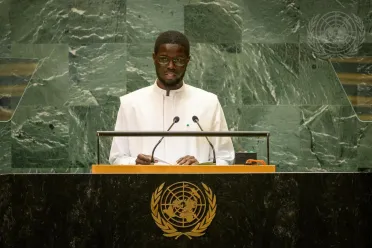Statement
Statement summary
BASSÍROU DIOMAYE DIAKHAR FAYE, President of Senegal, stressing that unity in diversity is the key to sustainable development and human dignity, said the international community has a collective responsibility to fulfil the United Nations’ promise of a fairer and more equitable world. “Ours is a troubled world,” he said, adding that justice and respect for human rights are being tested every day. Conflicts are spreading, inequalities are widening and the climate crisis is rendering millions of people across the planet even more vulnerable than they were before, he said, adding “that the world must stare the truth in the eye”. Resolutions adopted by the Assembly are treated with flagrant disregard, and the principles of the UN Charter “are kicked to the corner”. “Never before have the foundations of the United Nations been as shaky as they are now,” he said.
Turning to the Sahel where terrorist groups are sowing tragedy, pillaging and killing innocent civilians, he said this region was once stable but is now in the grips of daily violence. Yet, the Council remains inactive, he pointed out, stressing that the Sahel must not be allowed to become the theatre of foreign rivalries that will destabilize the region. Underscoring that peace in Africa is inextricably linked with global peace, he called on the Council to play its role as a guarantor of international peace and security. Also expressing deep concern about the tragic situation playing out in Palestine where entire generations have grown up in the shadow of oppression, he noted that his country is the Chair of the Committee on the Exercise of the Inalienable Rights of the Palestinian People and reiterated the calls for a ceasefire and a two-State solution. This is an open wound on the international conscience, he said, adding that international humanitarian law must be respected in all conflict zones.
“Peace is not simply the absence of war; peace is also every human being having the possibility of living in dignity,” he said, adding that food, housing, education and healthcare are crucial elements of a sustainable peace. Yet, more than 750 million people are going hungry, he noted, adding that the international community must not allow mechanisms for global governance to reproduce these inequalities. “It's high time to do away with a dog-eat-dog world,” he said, calling for urgent reforms of the Security Council, the IMF and the World Bank so that these institutions become more inclusive.
The African continent must have a more meaningful place in these decision-making bodies. It is also essential to repair economic injustices, he said, drawing attention to how illegal trade, tax evasion, illicit financial flows and abusive tax systems harm developing countries, including on his continent. Also stressing the need to tackle climate change while respecting the principle of common but differentiated responsibilities, he said the industrialized countries that are historically responsible for mass greenhouse gas emissions must step up their efforts to finance an equitable energy transition.
Full statement
Read the full statement, in PDF format.
Photo

Previous sessions
Access the statements from previous sessions.
